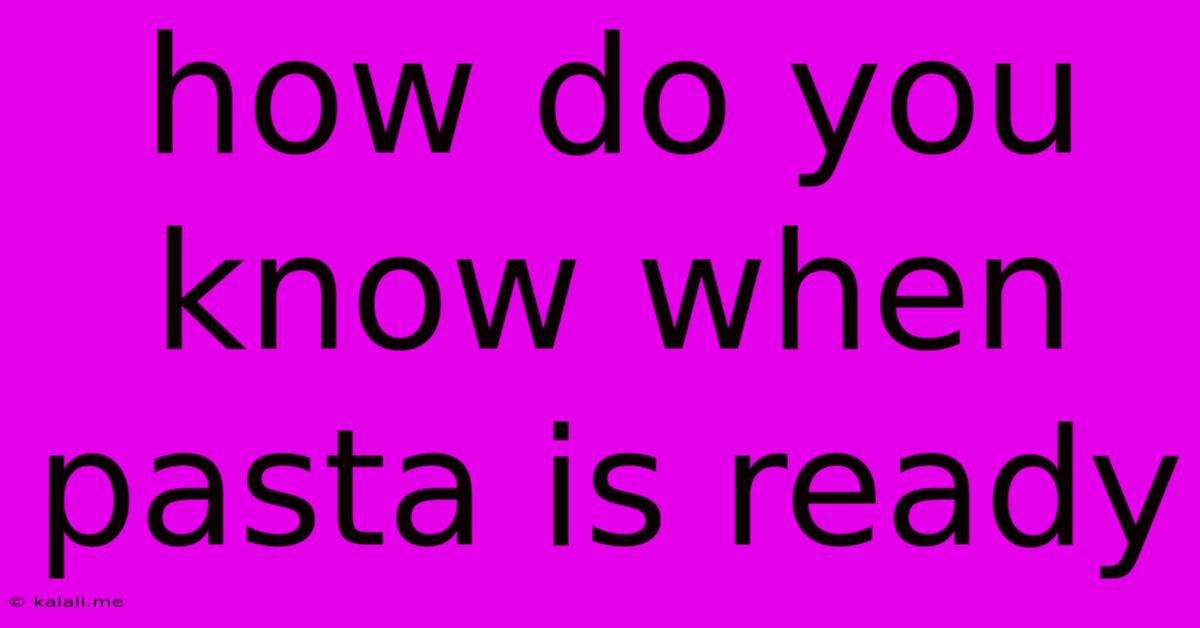How Do You Know When Pasta Is Ready
Kalali
May 24, 2025 · 3 min read

Table of Contents
How Do You Know When Pasta is Ready? A Guide to Perfectly Cooked Pasta
Knowing when your pasta is perfectly cooked is crucial for a delicious meal. Overcooked pasta becomes mushy and unappetizing, while undercooked pasta is tough and unpleasant to eat. This guide will teach you how to determine pasta doneness, ensuring you achieve that perfect al dente texture every time. This means you'll be able to master pasta cooking techniques and impress your friends and family with your culinary skills.
Understanding "Al Dente"
The term "al dente" is Italian for "to the tooth." It describes pasta that is firm to the bite, offering a slight resistance while still being tender. This is the ideal texture for most pasta dishes. Achieving this perfect balance requires careful attention to cooking time and the use of a timer.
Methods for Checking Pasta Doneness
There are several ways to determine if your pasta is ready:
1. The Bite Test: This is the most reliable method. After the pasta has cooked for the minimum time indicated on the package, fish out a single piece using a slotted spoon or tongs. Blow on it gently to cool it slightly, then bite it. If it offers a slight resistance but is not hard, it's al dente. If it's too soft, it's overcooked. If it's too firm, it needs more cooking time.
2. The Timer Method: Pasta packages usually provide cooking time guidelines. However, these are just estimations and can vary depending on factors such as the type of pasta, the amount of water, and the heat source. Always start checking your pasta a minute or two before the suggested time.
3. The Visual Cue: While not as reliable as the bite test, you can observe the pasta's appearance. As it cooks, the pasta will gradually lose its initial chalky white appearance and become slightly translucent. However, don't solely rely on visual cues as pasta can appear cooked even before reaching the al dente stage.
Factors Affecting Pasta Cooking Time
Several factors can influence how long your pasta needs to cook:
- Type of Pasta: Different pasta shapes and types have varying cooking times. Thicker pasta shapes like penne or rigatoni generally require longer cooking times than thinner shapes like spaghetti or angel hair pasta.
- Amount of Water: Using a large pot of water ensures even cooking and prevents the pasta from sticking together. A smaller amount of water may lead to uneven cooking and a stickier result.
- Heat Source: The intensity of your heat source will also affect cooking time. A high heat will cook pasta faster. However, be careful not to boil the water too aggressively as this can cause the pasta to break.
Troubleshooting Common Pasta Cooking Problems
- Mushy Pasta: This indicates overcooking. Next time, check the pasta earlier and use the bite test to avoid overcooking.
- Undercooked Pasta: This means the pasta needs more cooking time. Add a minute or two and check again. Don't let the pasta boil dry.
- Sticky Pasta: This often happens when using too little water or not stirring the pasta enough. Ensure ample water and stir occasionally to prevent sticking.
Mastering the Art of Pasta Cooking
By understanding these methods and factors, you'll be well on your way to perfectly cooked pasta every single time. Remember, practice makes perfect! Don't be afraid to experiment and find what works best for you and your stove. With a little patience and attention to detail, you'll soon be enjoying perfectly al dente pasta in all your favorite dishes.
Latest Posts
Latest Posts
-
Badges Swapped Accidentall Gen 1 Ug
May 24, 2025
-
And So They Were Both Bottoms
May 24, 2025
-
Water Temp For French Press Coffee
May 24, 2025
-
Spanish For Love Of My Life
May 24, 2025
-
Mfplayer Mini Mp3 Dac Output Circuit
May 24, 2025
Related Post
Thank you for visiting our website which covers about How Do You Know When Pasta Is Ready . We hope the information provided has been useful to you. Feel free to contact us if you have any questions or need further assistance. See you next time and don't miss to bookmark.